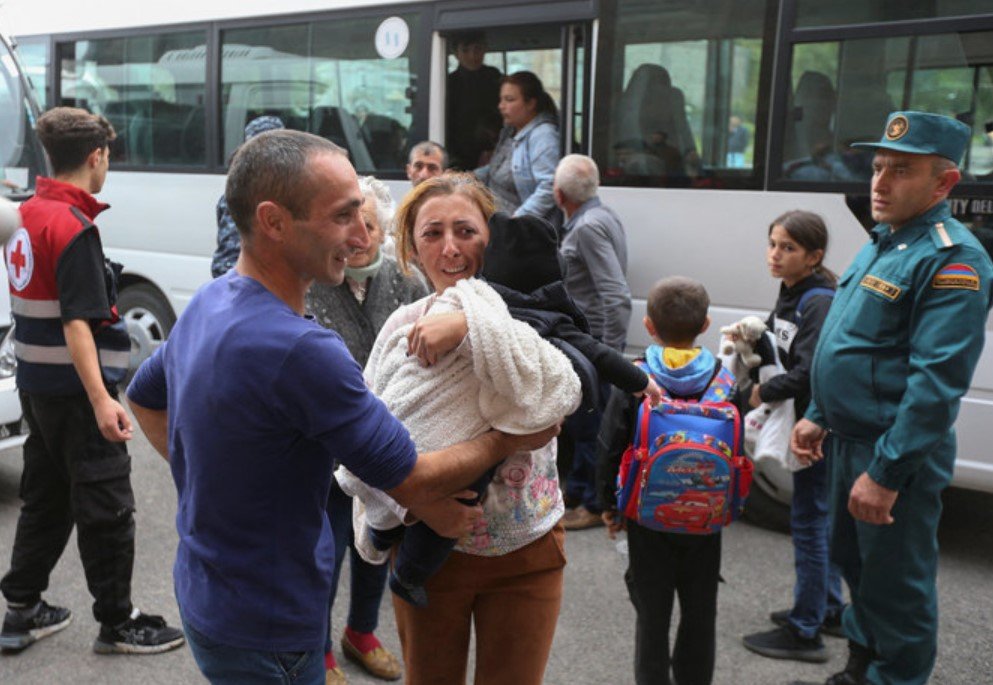Nagorno-Karabakh is a mountainous region in the South Caucasus, located within the internationally recognized borders of Azerbaijan, but populated by ethnic Armenians who reject Azerbaijani rule. The region has its own de facto government, backed by Armenia, but not recognized by any country.
The conflict over Nagorno-Karabakh dates back to the Soviet era, when the region was given to Azerbaijan as an autonomous province. In 1988, as the Soviet Union was collapsing, the region’s parliament voted to join Armenia, sparking a war that killed about 30,000 people and displaced hundreds of thousands more. A ceasefire was reached in 1994, but the status of the region remained unresolved.

In 2020, a new war broke out between Armenia and Azerbaijan over Nagorno-Karabakh, with Turkey supporting Azerbaijan and Russia mediating a peace deal. The war ended with Azerbaijan reclaiming most of the territory it had lost in the 1990s, including parts of Nagorno-Karabakh and seven surrounding districts. About 2,000 Russian peacekeepers were deployed to the region to monitor the ceasefire and protect the Lachin corridor, the only road connecting Nagorno-Karabakh to Armenia.
Why are ethnic Armenians leaving now?
Since December 2022, tensions have been rising in Nagorno-Karabakh, as Azerbaijan-backed activists blockaded the Lachin corridor, cutting off supplies and humanitarian aid to the enclave. Armenia accused Azerbaijan of using the blockade as a pretext to launch a new military offensive, while Azerbaijan claimed it was preventing arms smuggling and illegal activities by the local Armenian authorities.
On September 19, 2023, Azerbaijan announced it had started an “anti-terrorist operation” in Nagorno-Karabakh, targeting what it called “illegal Armenian armed groups”. The operation involved heavy shelling and air strikes on civilian areas, causing dozens of casualties and widespread damage. Armenia condemned the operation as a violation of the ceasefire and an attempt to ethnically cleanse the region.
On September 20, 2023, a ceasefire agreement was reached after international pressure and mediation by Russia. The agreement stipulated that the local Armenian government in Nagorno-Karabakh would dissolve itself and its military forces, and that Azerbaijan would guarantee the rights and security of the ethnic Armenian population. However, many ethnic Armenians expressed distrust and fear of living under Azerbaijani rule, and opted to leave their ancestral lands.
According to David Babayan, an adviser to Samvel Shahramanyan, the president of the self-styled “Republic of Artsakh”, 99.9% of the ethnic Armenians in Nagorno-Karabakh preferred to leave rather than stay under Azerbaijani control. He said that their fate would be a “disgrace and a shame” for Armenia and the world.
The first group of about 40 refugees arrived in Armenia on September 24, 2023, escorted by Russian peacekeepers. They were welcomed by Armenian officials and humanitarian workers, who offered them shelter and assistance. More groups are expected to follow in the coming days and weeks.
What is the international reaction?
The international community has expressed concern over the humanitarian situation in Nagorno-Karabakh and called for respect for human rights and international law. The European Union, the United States, France, Germany and other countries have urged both sides to abide by the ceasefire agreement and to engage in dialogue for a peaceful resolution of the conflict.
The president of the European Council, Charles Michel, told Azerbaijan’s president Ilham Aliyev to ensure full ceasefire and safe, dignified treatment by Azerbaijan of Karabakh Armenians. He also said that their human rights and security needed to be ensured and that access was needed for immediate humanitarian assistance.
Russia has played a key role in brokering the ceasefire agreement and providing peacekeeping forces in Nagorno-Karabakh. However, some analysts have questioned Russia’s ability and willingness to protect its ally Armenia from further aggression by Azerbaijan and Turkey. Russia has also faced criticism for its involvement in Ukraine’s conflict with pro-Russian separatists.
Turkey has been a staunch supporter of Azerbaijan in its quest to reclaim Nagorno-Karabakh and has provided military assistance and diplomatic backing. Turkey has also accused Armenia of occupying Azerbaijani territory and committing atrocities against civilians. Turkey has rejected any role for France or other Western countries in mediating the conflict.
